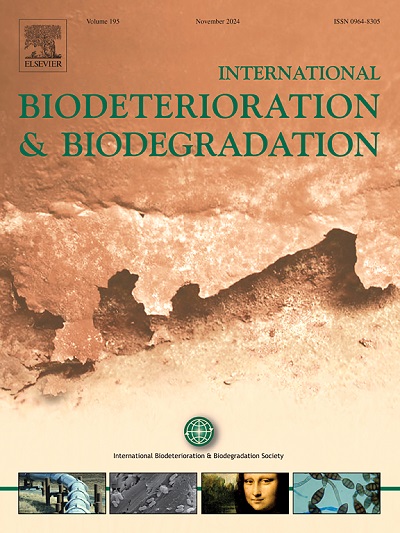提高海棠耐镉性和光合作用。通过激素茉莉酸甲酯
IF 4.1
2区 环境科学与生态学
Q2 BIOTECHNOLOGY & APPLIED MICROBIOLOGY
International Biodeterioration & Biodegradation
Pub Date : 2025-02-01
DOI:10.1016/j.ibiod.2024.105976
引用次数: 0
摘要
海棠花;高镉(Cd)耐蚀性景观植物——双滨草(C. bipinnatus)在镉污染修复中具有良好的应用前景。本研究探讨了茉莉酸甲酯(MeJA)在高Cd胁迫(40、120 μM)条件下通过调节内源激素增强Cd耐受性的作用。Cd胁迫严重影响了双翅草的鲜重/干重,降低了44.49% ~ 83.81%,叶绿素含量和光合效率(Fv/Fm)均下降。而低浓度MeJA (0.1 μM)处理可通过降低含水量3.09% ~ 22.43%、增加生物量12.82% ~ 52.73%、降低Cd吸收量4.56% ~ 5.64%、恢复叶绿素合成和Fv/Fm来提高Cd耐受性。MeJA还调节非蛋白硫醇(NPTs),特别是降低Cd胁迫下叶片的NPTs,并促进谷胱甘肽向植物螯合素的转化,这是解毒的关键。内源上,MeJA引发茉莉酸(jasmonic acid)、脱落酸(ABA)和吲哚-3-乙酸(indol -3-acetic acid)的快速积累,同时减少赤霉素(gibberellin),这对Cd胁迫下的光合作用有害。MeJA还可以防止ABA的长期积累,降低其水平,从而保护光合系统。这些发现强调了MeJA对激素平衡的调节作用,并为通过增强植物耐受机制有效修复土壤镉污染提供了新途径。本文章由计算机程序翻译,如有差异,请以英文原文为准。

Enhancing cadmium tolerance and photosynthesis in Cosmos bipinnatus Cav. By hormone methyl jasmonate
Cosmos bipinnatus Cav. (C. bipinnatus), a highly cadmium (Cd)-tolerant landscape plant, shows promise for Cd pollution remediation. This study investigates the role of methyl jasmonate (MeJA) in enhancing Cd tolerance under high Cd stress (40, 120 μM) by regulating endogenous hormones. Cd stress severely impacts C. bipinnatus, reducing fresh/dry weight by 44.49%–83.81%, alongside declines in chlorophyll content and photosynthetic efficiency (Fv/Fm). However, low-concentration MeJA (0.1 μM) improves Cd tolerance by reducing water content by 3.09%–22.43%, increasing biomass by 12.82%–52.73%, decreasing Cd uptake by 4.56%–5.64%, and restoring chlorophyll synthesis and Fv/Fm. MeJA also modulates non-protein thiols (NPTs), especially decreasing NPTs in leaves under Cd stress and enhances glutathione conversion to phytochelatins, critical for detoxification. Endogenously, MeJA triggers rapid accumulation of jasmonic acid, abscisic acid (ABA), and indole-3-acetic acid while reducing gibberellin, which can be harmful to photosynthesis under Cd stress. MeJA also prevents prolonged ABA accumulation, mitigating its levels, thus protecting the photosynthetic system. These findings highlight MeJA's regulatory effects on hormone balance and suggest new approaches for effective soil Cd pollution remediation through enhanced plant tolerance mechanisms.
求助全文
通过发布文献求助,成功后即可免费获取论文全文。
去求助
来源期刊
CiteScore
9.60
自引率
10.40%
发文量
107
审稿时长
21 days
期刊介绍:
International Biodeterioration and Biodegradation publishes original research papers and reviews on the biological causes of deterioration or degradation.

 求助内容:
求助内容: 应助结果提醒方式:
应助结果提醒方式:


